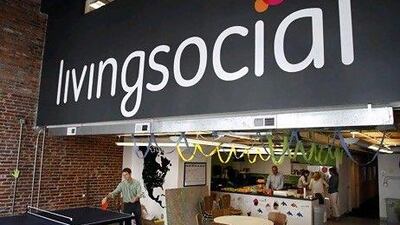LivingSocial has confirmed it is looking to exit the Middle East as it wrestles with a heavily loss-making operation, according to an internal email seen by The National.
Eric Eichmann the president of LivingSocial's international operations, outlined the reasons why the company was considering a sale and closing down the business in an email sent to employees on Thursday.
It emerged last week that LivingSocial had been in discussions with a number of potential buyers to sell its subscriber bases in the UAE, Egypt and Lebanon.
"Unfortunately, despite the aggressive efforts of our employees in the region, we have not been able to get our Mideast operations on a path to sustained profitability, and so we are looking at other options in those three countries," said Mr Eichmann in the email. "We have not made a final determination on our plans there, but we are likely to be exiting those markets either through a sale or suspension of those operations in the near future."
Documents seen by The National show LivingSocial has incurred significant losses in the region, and in one month this year it lost more than $500,000.
LivingSocial, which is head-quartered in Washington DC, has set an asking price of $3m for a total subscriber base of about 750,000 emails, but the company is said to be open to offers as low as $1m, according to sources.
The company entered the Middle East market last year through the acquisition of the regional deals site GoNabit for an undisclosed sum.
But it has since battled with intense competition in the cutthroat daily deals market in the region, with Cobone and Groupon Middle East its major competitors.
Mr Eichmann told LivingSocial staff that the company's aim was to become profitable in all markets and to invest in those countries that were displaying the greatest growth.
"Most of our major markets around the world are solidly on a trajectory for long-term success," Mr Eichmann said in his email. "Of particular note, Ticketmonster, the market leader in Korea, is showing fantastic momentum and recently announced that it had become cash-flow positive with the highest monthly gross billings in its history. We're also on a good path in the rest of Asia, Australia/New Zealand, and most of Europe, despite some challenges from the economic situation there."
Dan Stuart, the chief executive of LivingSocial Middle East, would not comment on the company's possible exit but said vouchers that had already been paid for by customers would be valid with merchants until the expiry date.
"Our terms haven't changed for the last two and a half years," he said. "Once someone buys a voucher on our website, the issuer of the voucher is the merchant and as the issuer of the voucher the merchant is responsible for delivering the service. Obviously, the voucher is always valid up until the point that it expires, and the expiry date is on the website and on the voucher too."
It is still unclear what will happen to the 90 staff that work for LivingSocial in the Middle East. The company is still sending out daily emails to its subscribers and offering vouchers to customers.
The company's possible exit from the Middle East comes as it records losses globally and retreats from other markets.
On the same day the company bought GoNabit last year, it launched operations in the Netherlands, but has since closed up shop in the country.
LivingSocial is part-owned by Amazon.com and narrowed its global loss to US$93 million (Dh341.6m) in the second quarter of this year. It posted revenues of $138m during the period compared with $59m a year earlier.
"In the larger picture, these moves are in line with the goals we set early this year and a natural part of the growth track for an ambitious global company that wants to win wherever it plays," said Mr Eichmann. "We are not going to settle for second place in Seoul, Sacramento, Seville, Sydney or anyplace else we compete."

